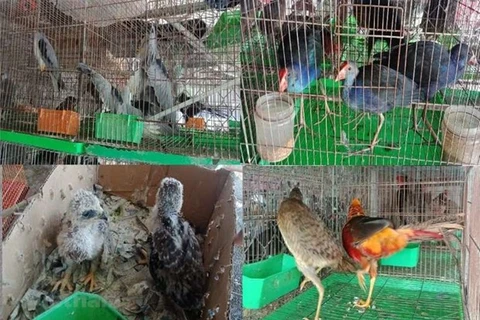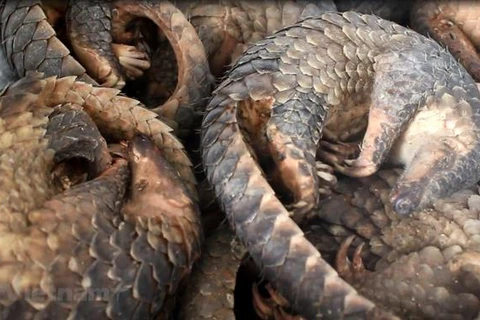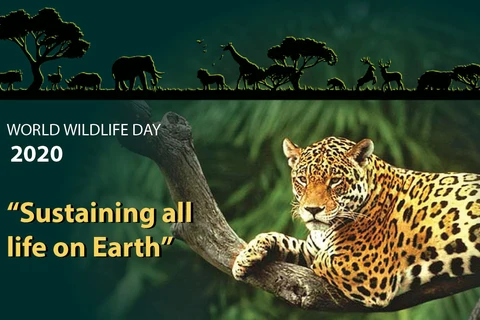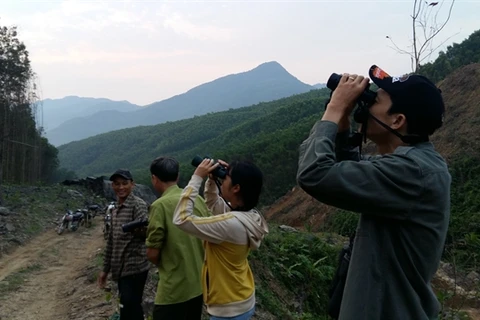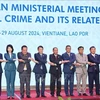Hanoi (VNS/VNA) - There is strong support among the Vietnamese public for addressing the root causes of COVID-19 and potential future novel zoonotic disease outbreaks caused by illegal wildlife hunting, trade and consumption, a World Wide Fund for Nature (WWF) survey found.
About 90 percent of 1,000 Vietnamese people who responded to the survey last month said they were very likely or likely to support efforts by governments and relevant ministries to close all illegal and unregulated markets and restaurants that sell wildlife.
While questions remain about the exact origins of COVID-19, the World Health Organisation has confirmed it is a zoonotic disease, meaning it jumped from wildlife to humans.
Illegal wildlife markets and restaurants are considered potential sources of disease transmission from wildlife to people.
A total of 15 percent of respondents in Vietnam said they or someone they knew had purchased wildlife for consumption in the last 12 months, 73 percent believed closing illegal and unregulated wildlife markets would help prevent similar pandemics and 72 percent believed closing illegal and unregulated restaurants selling wildlife would also help.
More than 80 percent of respondents said they would not be purchasing wildlife from such outlets in the future.
According to the WWF, continued awareness-raising on the risks to reduce consumer demand and policy and enforcement to reduce availability are required to remove the risk of future outbreaks and ensure that wildlife is protected.
“It is time to connect the dots between wildlife trade, environmental degradation and risks to human health. Taking action now for humans, as well as the many wildlife species threatened by consumption and trade, is crucial for all of our survival,” said Marco Lambertini, Director General of WWF International.
On March 6, Prime Minister Nguyen Xuan Phuc sent a letter to the Ministry of Agriculture and Rural Development to draft an urgent directive to ban illegal wildlife trade and consumption.
“Now more than ever, we feel an urgent sense of responsibility to stop future zoonotic transmissions. WWF stands ready to work with the Government of Vietnam and the relevant ministries to translate the directive into actions and put an end to the consumption and trade in wildlife,” said Dr Van Ngoc Thinh, Country Director of WWF-Vietnam.
The World Health Organisation (WHO) has reported that the current COVID-19 pandemic, along with at least 61 percent of all human pathogens, are zoonotic in origin. Other recent epidemics, including SARS, MERS and Ebola, have also all been traced back to viruses that spread from animals to people.
The illegal wildlife trade is the second-largest direct threat to biodiversity globally, after habitat destruction. Populations of vertebrate species on earth declined by an average 60 percent since 1970.
The new WWF survey was conducted in March among 5,000 participants from Hong Kong (China), Japan, Myanmar, Thailand, and Vietnam. It was the first survey of public opinion about the connection between COVID-19 and wildlife trade undertaken across Asia.
The survey found that 93 percent of respondents in Southeast Asia and Hong Kong supported action by their governments to eliminate illegal and unregulated markets./.
About 90 percent of 1,000 Vietnamese people who responded to the survey last month said they were very likely or likely to support efforts by governments and relevant ministries to close all illegal and unregulated markets and restaurants that sell wildlife.
While questions remain about the exact origins of COVID-19, the World Health Organisation has confirmed it is a zoonotic disease, meaning it jumped from wildlife to humans.
Illegal wildlife markets and restaurants are considered potential sources of disease transmission from wildlife to people.
A total of 15 percent of respondents in Vietnam said they or someone they knew had purchased wildlife for consumption in the last 12 months, 73 percent believed closing illegal and unregulated wildlife markets would help prevent similar pandemics and 72 percent believed closing illegal and unregulated restaurants selling wildlife would also help.
More than 80 percent of respondents said they would not be purchasing wildlife from such outlets in the future.
According to the WWF, continued awareness-raising on the risks to reduce consumer demand and policy and enforcement to reduce availability are required to remove the risk of future outbreaks and ensure that wildlife is protected.
“It is time to connect the dots between wildlife trade, environmental degradation and risks to human health. Taking action now for humans, as well as the many wildlife species threatened by consumption and trade, is crucial for all of our survival,” said Marco Lambertini, Director General of WWF International.
On March 6, Prime Minister Nguyen Xuan Phuc sent a letter to the Ministry of Agriculture and Rural Development to draft an urgent directive to ban illegal wildlife trade and consumption.
“Now more than ever, we feel an urgent sense of responsibility to stop future zoonotic transmissions. WWF stands ready to work with the Government of Vietnam and the relevant ministries to translate the directive into actions and put an end to the consumption and trade in wildlife,” said Dr Van Ngoc Thinh, Country Director of WWF-Vietnam.
The World Health Organisation (WHO) has reported that the current COVID-19 pandemic, along with at least 61 percent of all human pathogens, are zoonotic in origin. Other recent epidemics, including SARS, MERS and Ebola, have also all been traced back to viruses that spread from animals to people.
The illegal wildlife trade is the second-largest direct threat to biodiversity globally, after habitat destruction. Populations of vertebrate species on earth declined by an average 60 percent since 1970.
The new WWF survey was conducted in March among 5,000 participants from Hong Kong (China), Japan, Myanmar, Thailand, and Vietnam. It was the first survey of public opinion about the connection between COVID-19 and wildlife trade undertaken across Asia.
The survey found that 93 percent of respondents in Southeast Asia and Hong Kong supported action by their governments to eliminate illegal and unregulated markets./.
VNA

